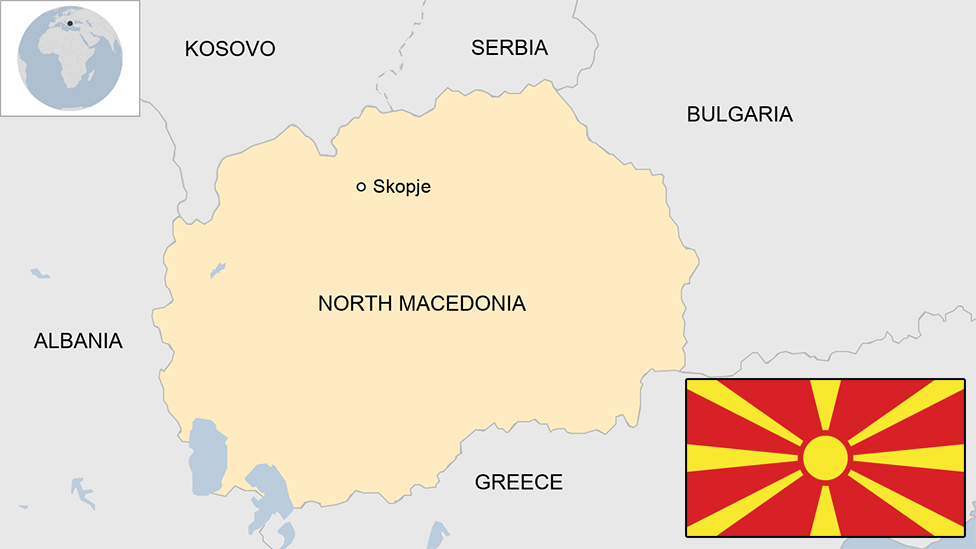Macedonia: The Balkan country waiting for Nato's invitation
- Published
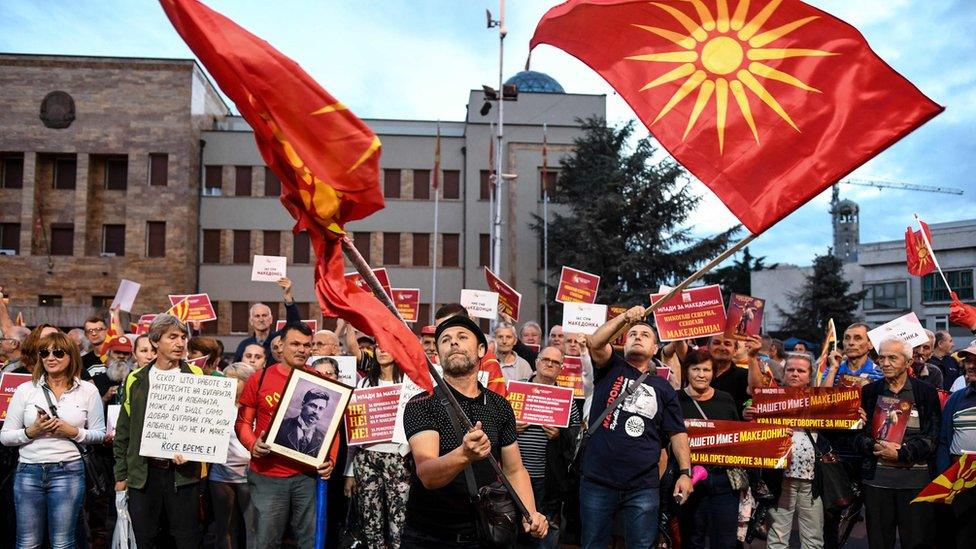
Macedonia's name change deal was met with some angry protests
When the leaders of Nato meet on Wednesday, they do so amid warnings that the very future of the Western alliance is at stake. But one small nation is confident that among the decisions the summit will take is an invitation for it to join.
Macedonia has reached a deal with Nato member Greece to unlock its path to membership of both the military alliance and the European Union.
Once it changes its name to the Republic of North Macedonia accession talks can begin. That will have to take place via a referendum and constitutional change in the former Yugoslav republic and by a parliamentary vote in neighbouring Greece.
In the case of the EU, membership is a distant prospect. Serbia and Montenegro are much further down the road towards accession - and they have been given a target date of 2025.
But Nato is a different matter. On the day that Macedonia and Greece signed the agreement on the name change, Secretary General Jens Stoltenberg was first out of the blocks with his congratulations.
"This will set Skopje on its path to Nato membership and it will help to consolidate peace and stability across the wider Western Balkans," he said.
'Nato's door is open'
Since then, the words have swiftly been converted into action.
When Mr Zaev visited Nato's Brussels headquarters at the end of last month, Mr Stoltenberg not only greeted him as "my dear friend Zoran", but made it clear that Nato membership was all but confirmed, providing that Skopje and Athens could see the name-change agreement over the line.
"This is an historic opportunity which cannot be missed," he said. "Nato's door is open, and you are now on the doorstep."
"We want to see you and your country at the heart of a stable, democratic and prosperous region. And we will support you."
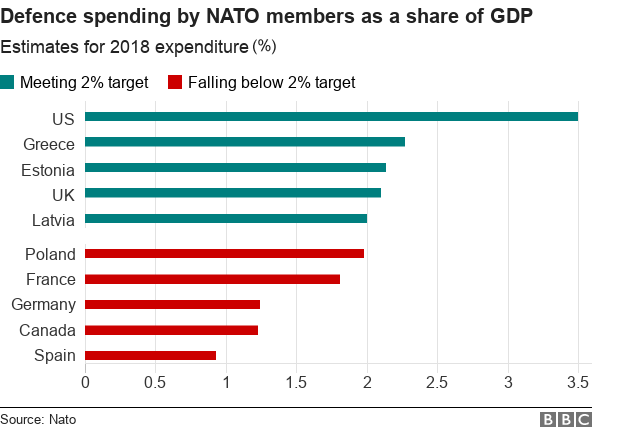

Mr Stoltenberg added that he was "very confident" that Nato's other members would approve accession talks and that North Macedonia would join the alliance "as soon as the internal processes have been finished".
This is music to Skopje's ears. As a small, poor, landlocked country in an historically turbulent region, it needs all the allies it can get.
Defence Minister Radmila Sekerinska told the BBC this was particularly true in the current geopolitical climate.
"Small countries do not create the wind - and this is a pretty windy period," she said.
While Macedonia has made clear its drive to join Nato is not a move against Russia, there have been concerns within the alliance of Moscow extending its influence in the Western Balkans.

Macedonia's Defence Minister Radmila Sekerinska says the country appreciates Nato's work
Ms Sekerinska noted that Macedonia had already been the beneficiary of Nato intervention, during the 2001 insurgency by ethnic-Albanian fighters. Nato brokered the ceasefire, leading to the Ohrid Agreement which guaranteed the rights of ethnic-Albanian Macedonians and holds to this day.
"It's very à la mode to be critical of Nato. But as citizens of Macedonia we appreciate their work."
"We are worried about certain geopolitical tendencies. It was easier to plan ahead a few years ago. This is why we don't have the luxury of making mistakes - I don't believe Nato and the EU have it either".
Reactions to the name change and impending Nato membership have been rather muted in Macedonia. Street parties have been notable by their absence, but protests have not gained much traction either.
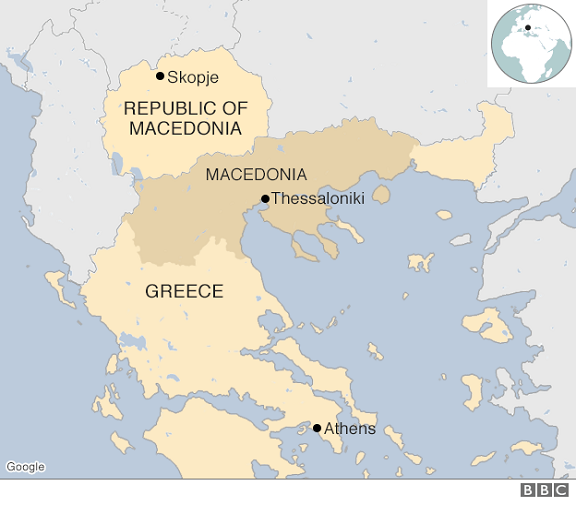

The opposition VMRO-DPMNE party attempted to recast Macedonia as the "cradle of civilisation" during its decade in government. And it has tried to portray the name agreement as a sell-out.
But the deal with Greece acknowledges both the people and language of the former Yugoslav republic as "Macedonian" - and that has taken the wind out of the nationalists' sails.
An important caveat remains. Everything depends on getting the deal with Athens over the line.
As Jens Stoltenberg pointed out to his Macedonian friend: "Without the finalisation of the agreement, your country cannot join Nato in the foreseeable future."
But this week's invitation from the alliance will add to the momentum building to break through three decades of stasis.
- Published12 June 2018
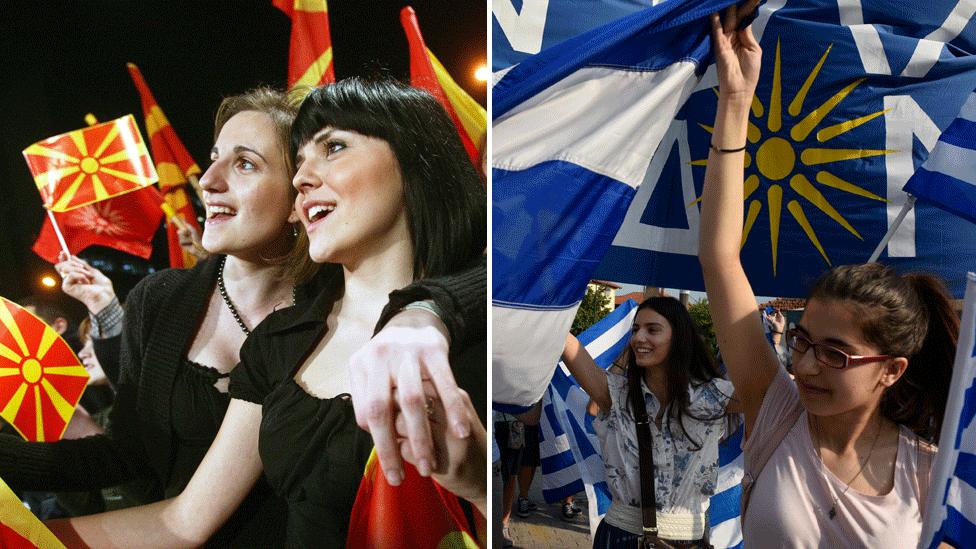
- Published10 June 2024
